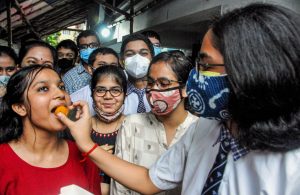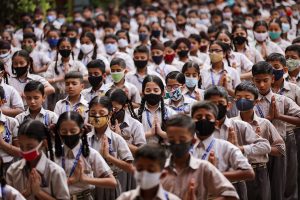The Union Cabinet approved the National Education Policy(NEP) 2020 on Wednesday. The NEP will bring a seismic reform in all aspects of the Indian education system. The new policy looks to universalize primary education by 2025 besides providing basic literacy and numerical competence for all. The Union Cabinet also renamed the Ministry of Human Resource and Development as the Ministry of Education.
Here are some of the key features of the new policy that has been implemented:
* It is the first education policy of the 21st century and replaces the thirty-four-year-old National Policy on Education (NPE), 1986.
* The new policy aims for universalisation of education from pre-school to secondary level with 100 percent Gross Enrolment Ratio (GER) in school education by 2030 and aims to raise GER in higher education to 50 percent by 2025.
* NEP 2020 will bring two crore out of school children back into the main stream.
* The 10+2 structure of school curricula is to be replaced by a 5+3+3+4 curricular structure corresponding to ages 3-8, 8-11, 11-14, and 14-18 years respectively. It will include 12 years of schooling and three years of Anganwadi and pre-schooling.
* NCERT will develop a National Curricular and Pedagogical Framework for Early Childhood Care and Education (NCPFECCE) for children up to the age of eight.
* NEP 2020 calls for setting up of a National Mission on Foundational Literacy and Numeracy by the Education Ministry. States will prepare an implementation plan for attaining universal foundational literacy and numeracy in all primary schools for all learners by grade 3 by 2025.
* A National Book Promotion Policy is to be formulated.
* All students will take school examinations in Grades 3, 5, and 8 which will be conducted by the appropriate authority. Board exams for Grades 10 and 12 will be continued, but redesigned with holistic development as the aim.
* A new National Assessment Centre, PARAKH (Performance Assessment, Review, and Analysis of Knowledge for Holistic Development), will be set up as a standard-setting body.
* NEP emphasises on setting up of Gender Inclusion Fund and also Special Education Zones for disadvantaged regions and groups.
* Every state/district will be encouraged to establish ‘Bal Bhavans’ as a special daytime boarding school, to participate in art-related, career-related, and play-related activities. Free school infrastructure can be used as Samajik Chetna Kendras.
* A common National Professional Standards for Teachers (NPST) will be developed by the National Council for Teacher Education by 2022, in consultation with NCERT, SCERTs, teachers and expert organizations from across levels and regions.
* States/UTs will set up independent State School Standards Authority (SSSA). The SCERT will develop a School Quality Assessment and Accreditation Framework (SQAAF) through consultations with all stakeholders.
* NEP 2020 aims to increase the Gross Enrolment Ratio in higher education including vocational education from 26.3 per cent in 2018 to 50 per cent by 2035 and aims to add 3.5 crore new seats to higher education institutions.
* The policy envisages broad-based, multi-disciplinary, holistic Under Graduate education with flexible curricula, creative combinations of subjects, integration of vocational education and multiple entry and exit points with appropriate certification.
* An Academic Bank of Credit is to be established for digitally storing academic credits earned from different HEIs so that these can be transferred and counted towards final degree earned.
* Multidisciplinary Education and Research Universities (MERUs), at par with IITs, IIMs, to be set up as models of best multidisciplinary education of global standards in the country.
* The National Research Foundation will be created as an apex body for fostering a strong research culture and building research capacity across higher education.
* Higher Education Commission of India(HECI) will be set up as a single overarching umbrella body for entire higher education, excluding medical and legal education.
* Public and private higher education institutions will be governed by the same set of norms for regulation, accreditation and academic standards.
* Affiliation of colleges is to be phased out in 15 years and a stage-wise mechanism is to be established for granting graded autonomy to colleges.
* A new and comprehensive National Curriculum Framework for Teacher Education, NCFTE 2021, will be formulated by the NCTE in consultation with NCERT.
* By 2030, the minimum degree qualification for teaching will be a 4-year integrated B.Ed. degree.
* Stringent action will be taken against substandard stand-alone Teacher Education Institutions (TEIs).
* A National Mission for Mentoring will be established, with a large pool of outstanding senior/retired faculty who would be willing to provide short and long-term mentoring/professional support to university/college teachers.
* The National Scholarship Portal will be expanded to track the progress of students receiving scholarships.
* Private HEIs will be encouraged to offer larger numbers of free ships and scholarships to their students.
* Measures such as online courses and digital repositories, funding for research, improved student services, credit-based recognition of MOOCs, etc., will be taken to ensure distance learning is at par with the highest quality in-class programmes.
* A comprehensive set of recommendations for promoting online education consequent to the recent rise in epidemics and pandemics in order to ensure preparedness with alternative modes of quality education whenever and wherever traditional modes of education are not possible, has been covered.
* A dedicated unit for the purpose of orchestrating the building of digital infrastructure, digital content and capacity building will be created in the HRD ministry to look after the e-education needs of both school and higher education.
* An autonomous body, the National Educational Technology Forum (NETF), will be created to provide a platform for the free exchange of ideas on the use of technology to enhance learning, assessment, planning, administration.
* NEP recommends setting an Indian Institute of Translation and Interpretation (IITI), National Institute (or Institutes) for Pali, Persian and Prakrit, strengthening of Sanskrit and all language departments in HEIs, and use mother tongue/local language as a medium of instruction in more HEI programmes.
* Internationalisation of education will be facilitated through both institutional collaborations, and student and faculty mobility and allowing entry of top world ranked universities to open campuses in India.
* Stand-alone technical universities, health science universities, legal and agricultural universities will aim to become multi-disciplinary institutions.
* Policy aims to achieve 100% youth and adult literacy.
* The Centre and the States will work together to increase the public investment in Education sector to reach 6 per cent of GDP at the earliest.






